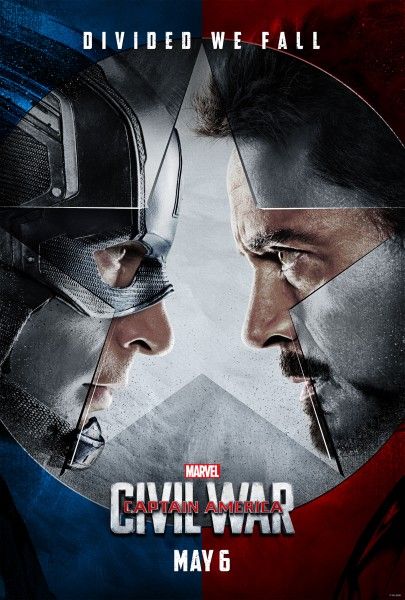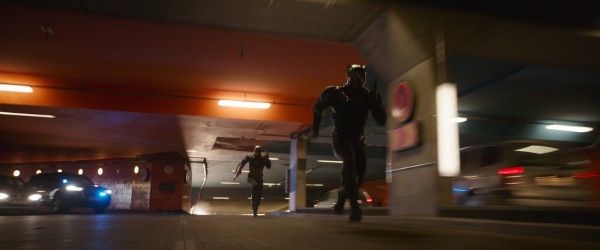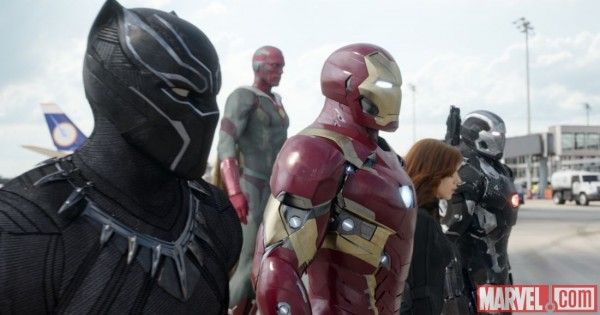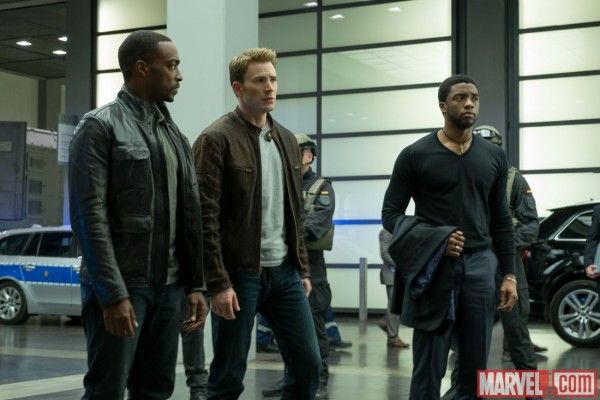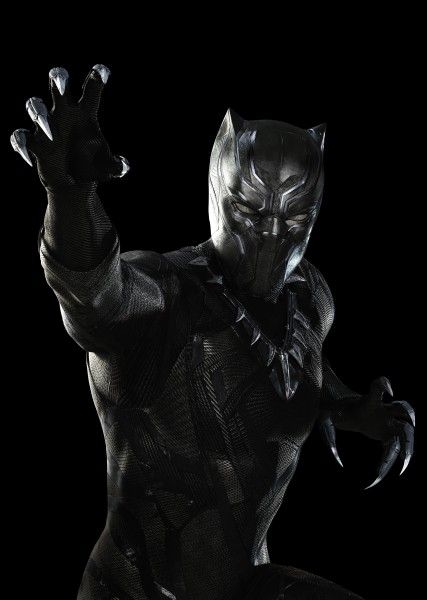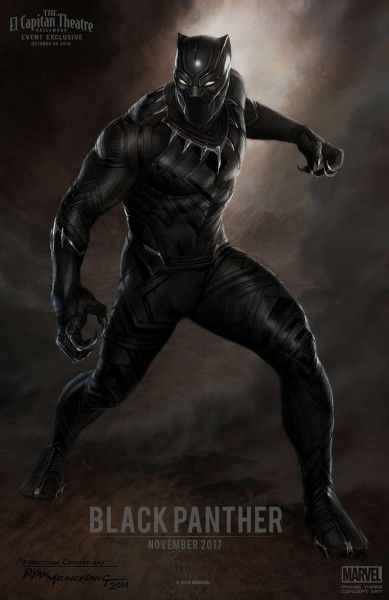One of the many exciting things about Captain America: Civil War is it will be the first time a Marvel Studios superhero gets introduced in a film when fans know that there’s a full spinoff waiting down the line. In a way, that’s a bit of a gamble because if audiences don’t take to that character, they’re likely not going to want the spinoff movie. But after speaking with Chadwick Boseman on the set of Civil War last May with a group of other reporters, there’s not much reason to worry with Black Panther as the actor, who although he was tight-lipped, seemed to have a firm understanding on what he wants to do with Prince T’Challa.
During our conversation, we talked how Black Panther figures into Wakandan society, how hot the costume is, how the character figures into the “civil war” divide between Captain America (Chris Evans) and Iron Man (Robert Downey Jr.), and more. Read the full interview below.
So how do you fit into this movie? Is this is an origin story for you, or do they just kind of throw you into the middle of it?
CHADWICK BOSEMAN: I'm just kind of thrown into the middle. It's definitely not an origin story, no. It's not an origin story.
So how do you factor in then? When we meet you, are you already Black Panther?
BOSEMAN: You meet me as the Prince of Wakanda. You meet me as a politician/monarch, not as a superhero.
So we'll see that transformation in this film maybe?
BOSEMAN: It's not necessarily a transformation. I am just thrown into the mix. To answer your question, yes, I am already a Black Panther.
Do we get to see Wakanda at all?
BOSEMAN: No. Sorry. I know you thought you were because of Age of Ultron, but... [Laughs] It's not happening.
Is there a Wakandan accent, or do you just speak in your regular voice?
BOSEMAN: Can I answer that? Yes! Yeah, there's a Wakandan accent.
What was it like putting on the costume for the first time?
BOSEMAN: It's hot. It's blazing hot. Listen, it's so hot. I've never been that hot before in my life, seriously.
Is it all one piece, or is it a multiple-step process to get into it?
BOSEMAN: I can't tell you that. [Laughs] I can't tell you that because I don't want you picturing how it happens. It's not cute.
You're in this movie obviously with all the other people playing costumed characters that they've already established. Were they able to give you any pointers, whether that be about dealing with the heat of the suit or just jumping into this world altogether?
BOSEMAN: You know what, I don't think there's any way for anybody to prepare you for this. I just think people have been very gracious and welcoming me on set, and even off set. What was more important was, you know, Chris has been very cool in terms of inviting me to stuff and giving me a hard time in the best way. His sense of humor is great. Robert Downey has been great as well, Mackie -- everybody. Everybody's been cool. Don Cheadle. So I've seen a lot of them separate from being here, so it didn't feel like when I got here it was like all of a sudden meeting them for the first time. I think that's what's weird, is when you step on the set and all of a sudden -- you know, I've worked with really great actors before, but there's always a certain amount of nervous energy, just because you don't know these people, so yeah.
You've had a recent run of playing iconic figures in history, like James Brown and Jackie Robinson. What's appealing about someone like Black Panther as a fictional character?
BOSEMAN: That he's fictional. [Laughs] That's the main thing. I don't have to -- not that I didn't like doing this. I loved interacting with the family members, the Brown family members, the Robinson family members. But in this case, I don't have to go talk to the Queen of Wakanda and tell her I’m playing her son. [Laughs]
But you do have that expectation of knowing about the comic book character. So how much research did you do, or were you already totally familiar?
BOSEMAN: No, I was not totally familiar. I think what you try to do is just get your hands on every single comic book you can find that has the character in it, or him being mentioned or anything. I've just tried to read them all -- not like it's really work. It is work -- don't get me wrong -- it is work, but it's just sort of reading them like a kid, you know? Because when you just read it like it's work, you're just trying to get through it. So I think it's putting yourself in that mind frame to go through the mythology in a fun way. And then, also, I've gone to South Africa, gone to some places, to see some things that I think relate to the character, and let those things sort of fuel your workouts, fuel your sessions when you work on the part.
Did you read a lot of comic books as a kid, and if so who were some of your favorites?
BOSEMAN: I didn't, I didn't. I wasn't a comic book geek as a kid. I read some, but it was just like, "Oh, I have this comic book here." It wasn't like I was collecting them. I didn't really collect much of anything -- baseball cards, nothing. I had some of them too, but I wasn't a collector. But this has been a much more aggressive intake of that material. It is interesting too because it's different than watching the films, different than reading a novel or anything else. It's a different way to -- I think it helps you a lot as a filmmaker because the exposition and things that happen in a film are done much differently than they are in a comic book, but some things do coincide. So I think it helps you as an artist.
So what separates your character from some of the other heroes that we've seen in terms of abilities, weapons, that kind of thing?
BOSEMAN: I can't say, if you're talking about his abilities. He's not the strongest, you know what I'm saying? He's not necessarily the fastest, but he's strong and he's fast. He has a wit, a wisdom and a plan -- an overarching plan -- that a lot of times you don't necessarily see. So it's his strategy during a fight or during a battle, and it's not just him that I think is the -- as far as the comic book goes, I think that's different. As far as this movie, you know, this is an introduction to the character.
Do you see a lot of action in this movie?
BOSEMAN: I see a fair share, I see a fair share... I think the difference in him is that he's a ruler of a country. That's the difference. I wouldn't even call him a superhero. In the mythology of the country, he's not a superhero. He's a warrior, and it's part of their tradition. It's not like he's like, "Who is that masked guy that's doing this stuff?" Everybody knows it's him, and they expect that it's him, and they pray to God, or even praying to him in some cases, that he would do the things that he's doing. Which is much different than most of the superheroes in which you don't know their identity and you don't know when they might show up. There's an expectation that's much different. So that's the main difference.
You said that you pretty aggressively took in Black Panther in order to get ready for the role. Was there any particular story arc of his that you really related to?
BOSEMAN: See, I knew somebody was going to ask that question, and the answer is "yes," but I'm not going to tell you which one, because if I tell you which one, you're going to say, "Oh, that's what the Black Panther movie is going to be about." So the answer is "yes" and "none a' ya business." [Laughs]
Have the events of the previous movies weighed on the way this character sees the world? Is he sort of like, "Hey remember when that country went into the sky?" What is his awareness of that?
BOSEMAN: He's aware of the Avengers, absolutely, yeah.
What's his perception of them as far as how their existence and the destruction that usually comes with them being heroes has affected his country and his people?
BOSEMAN: Clever. That's very clever of you. [Laughs] I think as far as -- because you're referring to the comic book -- he sees both sides of the coin. He sees both sides. It's necessary to stop crime and to protect your country. He understands that, because that's what he has to do. But there's a way to do it that is the best way. Like if it was the Art of War, it would be like, how can you inflict less pain? How can fewer people die and still win the war? He's a tactician. He's a strategist, so he appreciates that thought process. So it's both sides.
Would you say then he is sort of the middle ground between Captain America and Iron Man?
BOSEMAN: He's definitely a middle ground at this point, yeah.
You mentioned he's a ruler, he's a politician as well, and we know from Avengers: Age of Ultron now there are people who know about Wakanda. Is Wakanda known throughout the whole world, or is it still a secretive society?
BOSEMAN: Wakanda is known to the world, yes. [Laughs]
Now, when you said we first meet you as the ruler of Wakanda --
BOSEMAN: I did say that.
Will we get to meet any of his family or guards or anyone of that nature in this movie, or is that going to be saved for your movie?
BOSEMAN: Ah... you gotta wait. I'm sorry. All being saved for...
You mentioned this was the introduction to your character. How do the events of this film inform Black Panther's solo film?
BOSEMAN: Well, just in a basic way. You're seeing him in the larger scheme of things, like fighting outside of his country. So it will definitely affect what you see later. That's all I can say. [Laughs]
On that note, I think this is the first time we've seen a Marvel movie introduce a major character in another film knowing that afterwards there will also be a solo film for him.
BOSEMAN: Is it?
I think so, yeah.
BOSEMAN: Wow, I feel special.
But I'm curious about what you feel makes this story right for introducing Black Panther. Do you see any advantages for being introduced in this way and being able to burn the character in a supporting role before headlining your own film as the star?
BOSEMAN: Yeah, absolutely. Like if I was doing my own comedy show on HBO or something, in most cases I would go do standup at The Comedy Store in LA or some local spot, and I would gear up to do that. So when you see Thor, you know, "Who's going to be Thor?" that's a rough way to do it. It's much better to -- and particularly, in this case, a lot of people don't know who Black Panther is. So I think they're really smart to introduce him and let people know, "Oh, yeah, this guy was one of the major comic book characters. He was part of the Avengers." That history is important for people to get before you have a standalone movie. So I think it's the best way to do it, absolutely.
Is there anything that you wanted to write into the character that wasn't in the comic book originally?
BOSEMAN: Yes, and I'm not answering that. [Laughs] Yeah, there are definitely things that I think will show up more so later. I shouldn't say that they're not in the comic books, because they've been written by several different writers: Kirby, Stan Lee, Christopher Priest -- all of the writers have come up with different aspects of who he is. So you could take different things from each one, and they don't contradict each other necessarily. The principals and essence of who he is are still there. He's a little cooler in some of them. In Christopher Priest's version, he doesn't trust anybody, you know what I'm saying? All of it is good stuff to use. There's a sense of him searching for himself in some of the ones in the '80s, which I think is really good. I don't know what's going to happen, but I think a lot of those things are good things to put into a movie.
How do you interact with characters like Tony Stark or Steve Rogers? As a prince, do you look at them as equals, or should these guys take orders from you?
BOSEMAN: [Laughs] That's a good question. I would say it's both. There's always going to be a sense, like if you're a monarch, that you -- it's not a superiority, but I could always call rank if I have my own country, you know? [Laughs] There's a space in which I rule. If I'm not in that space, it's much different though. We're not in Wakanda, as I said, and all is fair in love and war. Things become equal in war. If you're not an officer on one side or the other, you can't really pull rank.
It was quite awhile from when they announced that you were Black Panther to you guys filming this. So did the anticipation keep building, or did you just get to a point where you were like, "Just put me in the suit, man"?
BOSEMAN: No, I have not gotten to the point where I've said, "Just put me in the suit," because that suit is hot! [Laughs] Once you're in it, you're ready, but once I realized how hot that suit was going to be, I've not said that one time.
Introducing him in this movie to get audiences more used to Black Panther, does this mean that when you do get into the Black Panther movie it won't be an origin, that you can take off running? Or will they still need to explain more about Black Panther, like his abilities and things?
BOSEMAN: I can't really answer that question -- not because I'm trying to be dodgy or anything -- but anything is possible in film, because flashbacks. Like, you never know. I can't answer that, because there's no script. So it's just best to say, "I don't know." [Laughs]
But you assume that Black Panther the movie takes place after Civil War. You assume it's not set in the past.
BOSEMAN: I don't think you can assume anything, because there's also such a thing as a prequel also. I think anything is possible.
For more of our Captain America: Civil War set visit coverage, click on the links below:
- ‘Captain America: Civil War': 115 Things to Know about Marvel’s New “Sprawling, Epic” Film
- ‘Captain America: Civil War’ Directors Joe & Anthony Russo on Crafting a Psychological Thriller
- ‘Captain America: Civil War’: Chris Evans & Sebastian Stan on Playing Men out of Time
- ‘Captain America: Civil War’: Robert Downey Jr. on the “Sokovia Accords” and Irreparable Things
- ‘Captain America: Civil War’ Screenwriters Explain How This Is Not an ‘Avengers’ Movie


